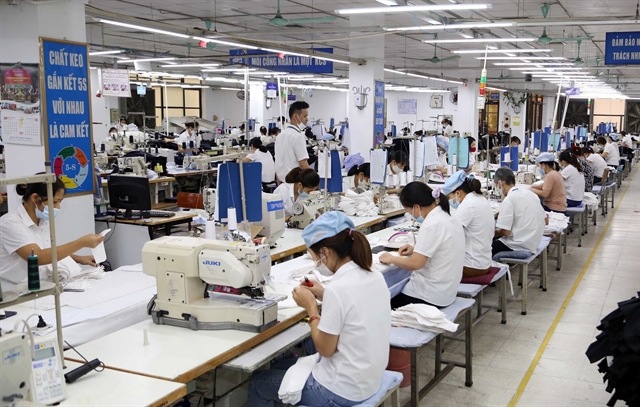 Economy
Economy


|
| Workers at a textile factory in Việt Nam. The country's GDP has been forecast to grow by 7.5 per cent this year by the ASEAN+3 Macroeconomic Research Office. — VNA/VNS Photo |
SINGAPORE — Economic prospects for ASEAN+3 (Association of Southeast Asian Nations plus China, Japan and Korea) look promising in 2022, despite challenges from the COVID-19 pandemic and the global economy, according to a report published on Tuesday by the ASEAN+3 Macroeconomic Research Office (AMRO).
Việt Nam's GDP has been forecast to be among the fastest-growing this year at 7.5 per cent from the previous year, well above the bloc's average at 4.9 per cent.
AMRO points out that the emergence of the Omicron variant towards the end of 2021 brought new uncertainties and set back the progress of economic re-opening. However, high vaccination coverage has mitigated the risk of nationwide lockdowns, as experienced during the early days of the pandemic.
“The ASEAN+3 region has sufficient policy space to navigate through these new challenges, and stay on its recovery path,” says AMRO’s Chief Economist, Dr Hoe Ee Khor.
“A resurgence of infections continues to be the key downside risk, amplified by lingering global supply chain disruptions and rising global price pressures,” adds Dr Khor. “While the rise in global inflation is likely to prompt major advanced economies to roll back extraordinary monetary support earlier or more sharply than anticipated, the spillover effects for the region is likely to be limited because of greater resilience.”
AMRO maintains a positive outlook on ASEAN+3 economies for 2022, with regional GDP growth of 4.9 per cent and inflation remaining relatively low at 2.9 per cent for the year.
AMRO’s baseline 2022 GDP growth forecast for the ASEAN+3 region assumes a continued improvement in the global economy, but at a slower pace due to the Omicron variant. AMRO has kept broadly unchanged its GDP growth projections for the Plus-3 economies of China; Hong Kong, China; Japan and Korea. Forecasts for six of the 10 ASEAN economies have been revised only slightly downwards. Inflation for the ASEAN+3 economies should rise slightly higher than AMRO’s last forecast in October 2021, but consumer price rises will stay relatively low when compared with other regions globally.
The ASEAN+3 Macroeconomic Research Office (AMRO) is an international organisation established to contribute towards securing the macroeconomic and financial stability of the ASEAN+3 region, comprising 10 members of the Association of Southeast Asian Nations (ASEAN) and China; Hong Kong, China; Japan; and Korea. — VNS




